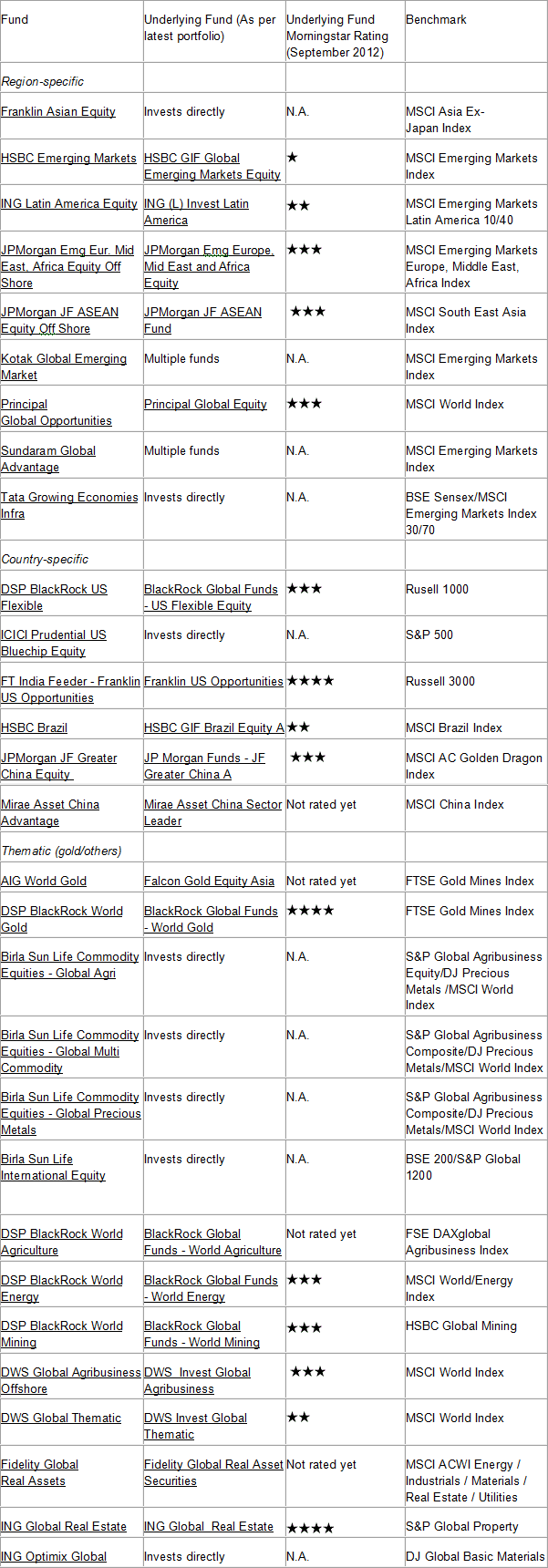 | « Back to article | Print this article |
A guide to investing in global mutual funds
Investing in global mutual funds has its share of risks and benefits. Here's everything you need to know about investing globally.
Investing in mutual funds that invest in other countries is sometimes a useful, if tricky, addition to your portfolio.
Here is a lowdown on the pros and cons that investing in global mutual fund offers.
Benefits
Greater access to niche plays
Global investing opens up your investing horizons to areas you can't normally access. For instance, you could be bullish on gold and would want exposure to gold-mining companies based in Australia. A gold-mining international fund would make the perfect fit for your portfolio.
If you are, for instance, bullish on the growth prospects of technology behemoths Apple and Google, a Nasdaq ETF would be the way to go.
A guide to investing in global mutual funds
Diversification
It's a known fact that the greater the diversification, the more uncorrelated a portfolio will be. So if oil prices shoot through the roof, it may be bad news for an importing nation such as India, and thereby Indian stocks, but an international fund that invests in stocks of resource-rich Brazil could offer you some respite.
Hedge
A well-diversified portfolio works as a good hedge: a case in point, in 2011, the Indian market ended the year down over 20 per cent but the US market closed about flat. An investment in Motilal Oswal's Nasdaq 100 ETF would have netted positive returns not just because of the difference in performance of both countries' stock markets but also because the Indian rupee fell while the dollar rose during the period (Currency movement, however, can also be a risk as elaborated upon in the next point).
A guide to investing in global mutual funds
Currency risk
Forex risk is a major reason to be careful while investing in global funds as it can work for an investor both ways. So even if a global fund posts positive returns during a specific period, if the local currency of the country it is investing in goes down against the rupee, it could trim or wipe out your gains.
Tax treatment
From a tax standpoint, the treatment of global mutual funds is similar to local debt funds and does not enjoy the favourable treatment given to equity funds in India. An investor should remember that post tax gains from global mutual funds would be different from what he would expect from a typical equity fund.
A guide to investing in global mutual funds
Lack of research
Most global funds launched in India are of the fund-of-fund structure where the Indian fund invests into either one-feeder fund domiciled abroad (which invests according to its mandate) or in a basket of underlying international funds.
An Indian investor may not have the wherewithal to gather adequate information about the underlying global fund(s) and whether they make a good fit in his portfolio.
Later in this article, however, we have put together a list of global funds available in India, underlying funds they invest in, along with information available on them (such as star rating) and pages where you could find additional information.
High expenses
Because of fund-of-fund structure that exists generally, global funds may have a higher expense ratio due to the dual nature of management expenses involved at the local and international levels.
Here are some global mutual funds rated by Morningstar





